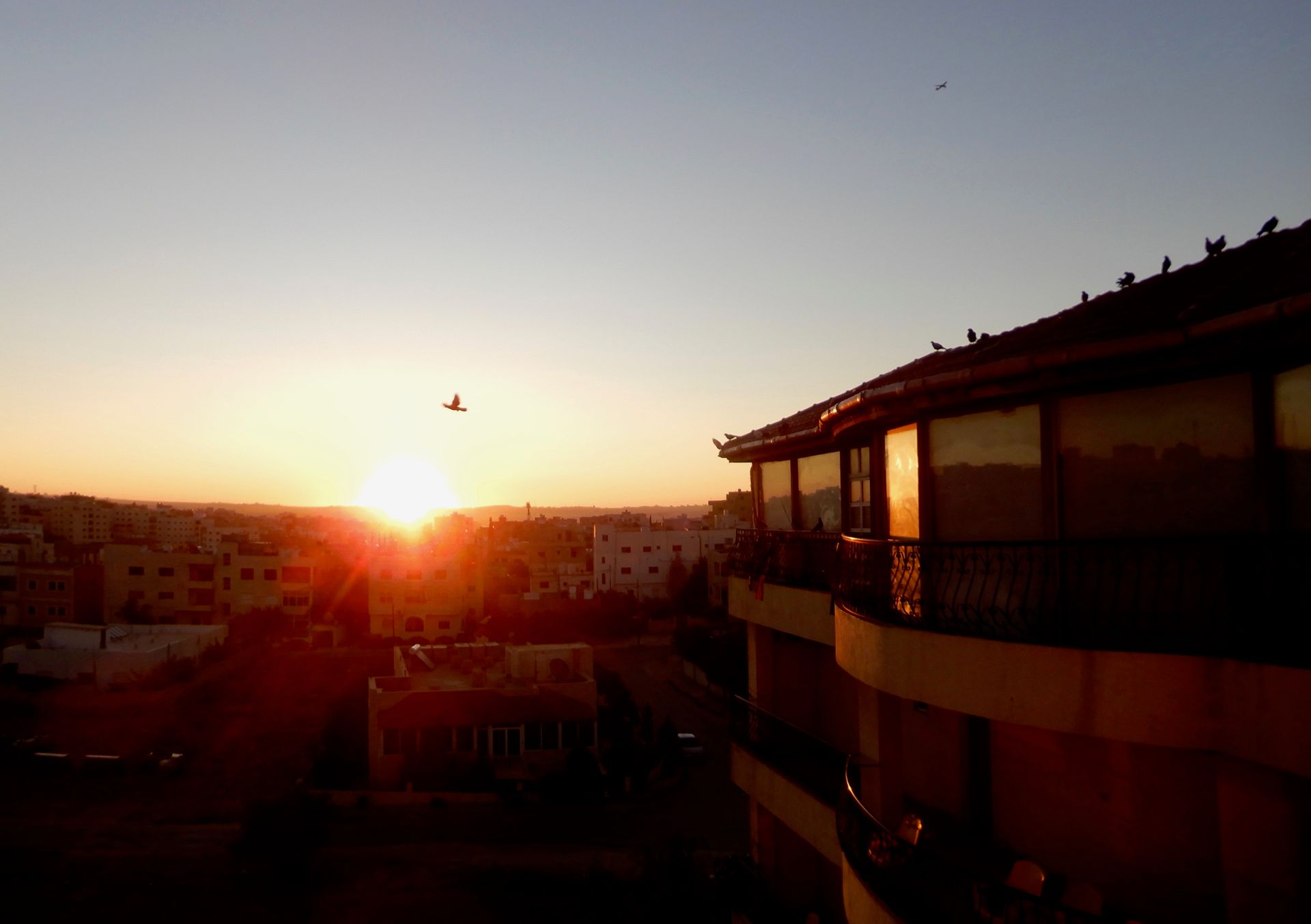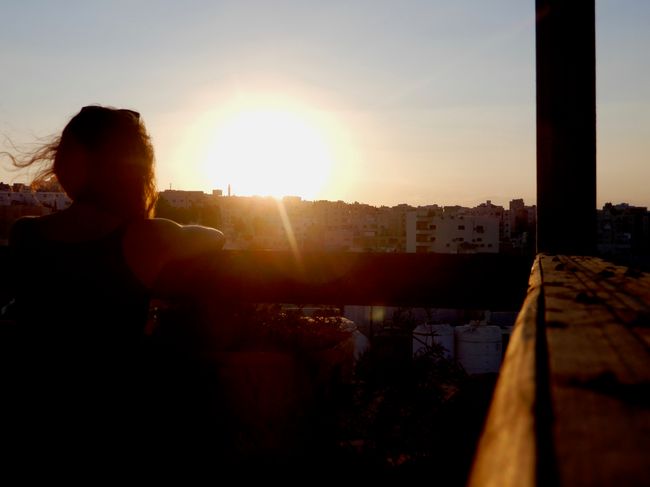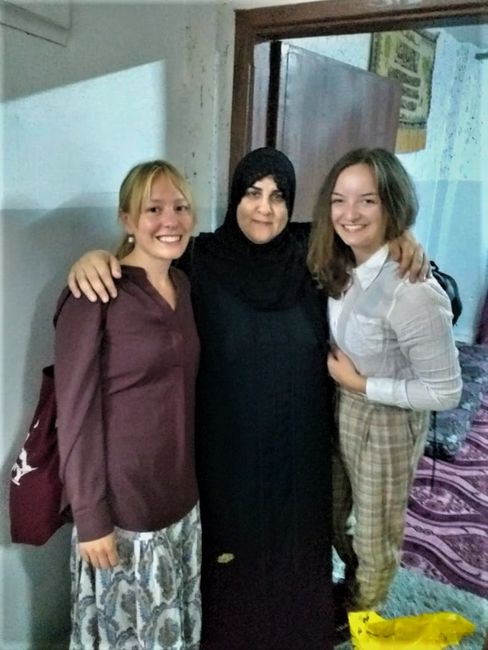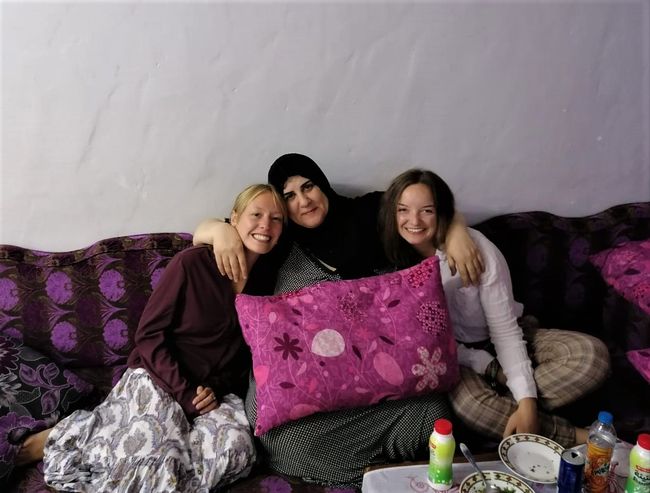Umm Hayan.
Nəşr edilmişdir: 02.11.2019
Bülletenə abunə olun
Friday, November 1st
8 am. After spending some time with my new laptop in the morning, Jesús and Markus arrive at our place in the morning. We were offered by the university in Würzburg to participate in a law lecture via Skype, which our classmates are attending this semester in Würzburg. Although I would really like to take advantage of this opportunity, I'm afraid it might be too time-consuming. Currently, I'm already overwhelmed with university work after my two-week laptop break. Fortunately, we don't have to decide directly whether we want to attend the lecture and the corresponding exam, and I will meet up with Shawqi afterwards.
Shawqi is our Palestinian classmate who unfortunately had to drop out of our university program at GJU. After spending some time with his family in Palestine, he is now back in Amman and looking for a job. He shows me a very good local restaurant in the otherwise internationally dominated neighborhood of Weibdeh, where we have a classic and incredibly delicious Arabic breakfast. It's always good to be with locals - I have walked past this inconspicuous restaurant many times on my way to Sophia, but I would never have discovered it myself. After a little private Arabic lesson in a cute café, Shawqi takes me to Paris Circle, where Sophia is already waiting for me. Today, both of us are following an invitation from Umm Hayan.
Umm Hayan ("Umm" here refers to mother, so "Mother of Hayan," and "Abu" at the beginning of a name stands for "Father of...") is a Syrian woman whom we met last week at the Créme workshop at Tarabot. Sophia and I sat at a table with her, and she invited us to her home without us communicating much (due to the known language barrier). The fact that two of her sons now live in Germany has generated enough sympathy for us to invite us for a meal at her place. How we managed to clarify the date and details with her is another story, and one can only believe it if they were there to witness it with their own eyes. However, when I showed Shawqi the location of Umm Hayan's apartment on Google Maps shortly before, he reacted cautiously and tried to tell me in a very careful and respectful way that this neighborhood is not exactly the safest area of Amman. He offers us to take care of a shuttle service for us together with a friend, in case there are any problems with Uber.
Not at first: Sitting in the safe Uber taxi, Sophia and I soon get an idea of what Shawqi could have meant. After passing Tarabot, we drive deeper into East Amman, and the amount of garbage on the streets increases, the facades of the houses become dirtier, and we notice that most of the shops along the roadside have their shutters closed on this holy Friday. A sign that this is a rather conservative residential area. After about 20 minutes, our Uber driver now drives up a steep road and stops at a crossing side street. "Hun?" ("Here?"), he asks. Sophia and I look out of the car. This is the location that Umm Hayan sent us on Google Maps, but we don't know the exact house number either. We decide on the easiest solution, call Umm Hayan and hand the phone over to the Uber driver.
After a short conversation, an older man excitedly knocks on our Uber. He is wearing a long robe and waves to us with joy. Umm Hayan's husband. So we get out of the car and follow his quick steps to a nearby small house. We go down the stairs in front of the house through a small gate, and Umm Hayan is already waiting for us in front of the basement apartment. Saying that she is overjoyed would be an understatement. She can't wait to hug us and kiss our cheeks. "Ahlan, ahlan!" she says repeatedly, which means "Welcome!" With sweeping hand movements, she asks us to enter her apartment. After a small entrance area, we find ourselves in a room of about 15 square meters, which seems to be the main part of the apartment. From there, we can see a small kitchen and a bedroom. The whole apartment is covered with a purple patterned carpet. Here in the living room, there are numerous flat cushions on the walls, at the end of the room stands a small table on the floor, and a TV and a clock hang on the wall. Otherwise, there is no furniture.
We don't even follow Umm Hayan's invitation to sit around the small table when she hands us her phone, with which she just made a video call to her son Hayan. Hayan lives with his soon-to-be eight-member family in Stuttgart and speaks fairly good German with us. His children sit next to him shyly looking into the camera, while Umm Hayan, with her wild gestures and loud Arabic sentences, adds excitement, while she excitedly moves back and forth between the kitchen and the living room. Her husband eventually lets us know that it's time for food and places a plastic bag full of soft drinks on the table. Umm Hayan then brings the food: tabbouleh, a salad made of parsley, tomatoes, and bulgur, as well as kibbeh. And not just a small portion. Kibbeh are egg-shaped dumplings made of bulgur, filled with a mixture of minced meat, onions, and nuts. Umm Hayan now takes her phone back from us and tells us with a "Yallah!" to start eating.
The food tastes incredibly delicious, and Sophia and I rush to tell Umm Hayan, who watches us expectantly while we eat. She again takes out her phone and takes photos and videos of us, which she sends to her children, she tells us. She has four sons and two daughters. Two of her sons live in Germany, one in Sudan, and one in Kuwait. One of her daughters lives in Kuwait, and the youngest one lives near her in East Amman. Her husband died in the war in Syria. The widow is left behind with her three children, one of whom now comes into the apartment to join us. His name is Ahmed, and he is 12 years old. He greets us shyly and then sits down at a further away cushion with a safe distance. Umm Hayan, meanwhile, is still busy with her phone and keeps introducing us to one of her children through video calls, whom we greet with waving hands and the same sentences every time. The whole situation is a bit overwhelming for me, and I'm glad when Umm Hayan takes a short break from her phone, and we can enjoy her delicacies in a calmer atmosphere. She tells us that they have been living here with her husband for 7 years. They are from Homs. "Homs!" she says, puts her hand on her heart, and takes a deep breath. Then she unexpectedly starts crying.
Sophia and I pause with kibbeh in hand. Umm Hayan shakes her head sobbingly, and from what she says, I understand that she misses her home. I feel a pang in my heart, feel overwhelmed and helpless, and have to hold back my own emotions. How must this woman feel who actually has a huge family with her children and numerous grandchildren but now lives alone with her husband in a foreign country. For seven years. Every day of it with the hope of eventually returning home. And yet, nothing will be the same there as it once was. "We hope that you can go back someday," Sophia formulates in Arabic, which Umm Hayan comments on with an "In sha Alla" - God willing. Then she composes herself and tells us to continue eating so we won't be sad anymore. The feeling of helplessness remains.
After we almost burst from the oily kibbeh at some point, Umm Hayan clears away the food and brings us coffee and chocolate. In the meantime, she takes more photos and videos and alternately calls her sons and daughters in Germany and Kuwait. She also asks for photos of Sophia's and my parents and tells us that she is now our mother here in Jordan. And that we are always welcome at her home. Her husband then asks directly when we will come again. In a few days? In a week? Sophia and I are still a little overwhelmed by the whole situation. Maybe in two or three weeks, we say. Umm Hayan and her husband are satisfied, and we decide to order an Uber now. Time to go.
As a conclusion, we take a few pictures with her, and she gives us a container of kibbeh in a plastic box. She also sprays an excessive amount of her perfume on Sophia and me as a farewell gesture. With Umm Hayan in our nose and heart, we then head back to central Amman in the Uber. It will take a while for me to process all of this.
Bülletenə abunə olun
Cavab verin



